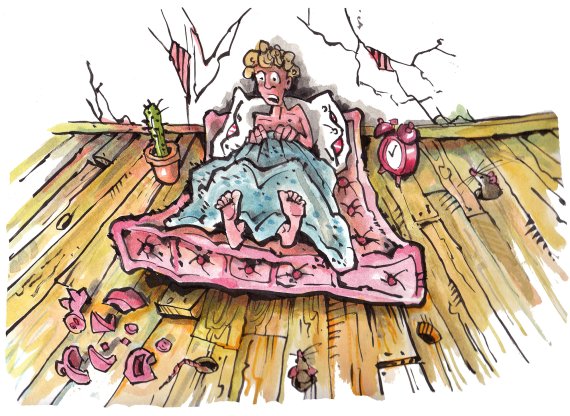
Charlotte van der Zon (23)
MSc Food Technology
‘I sometimes worry about my student debt. During my BSc programme I was still getting a basic grant through the old system and I borrowed a little bit on top of that for nice activities. Now I borrow the same amount of money I was getting then, so the debt mounts up a lot faster. I’m not worried about paying it off as such, because that will be between 70 and 100 euros a month. That is doable. But I do want to be able to buy a house and a student debt can easily make a difference of 30 to 40 thousand euros on a mortgage. I do worry about that. And if you want to go away for a weekend, or go out for a meal, money plays a role. Sometimes you just can’t do it. Then I try to make sure I can do it the next month. You should have a bit of fun while you’re a student.’

Lena van der Sman (19)
Bsc student of Environmental Sciences
‘If I look up my debt on My DUO, I think, oh yes, I’ve got to pay that back some time. As an environmental scientist I will probably get a job, but the question is how much I will earn. And I am not clear about how paying back the debt will work. The government says: we’ll take the basic grant away. But they don’t make sure it is clear to students how much we are going to have to pay back.’

Roos Verstegen (22)
MSc student of Nutrition and Health and member of the Student Council party VeSte (speaking in a personal capacity)
‘Of course I occasionally worry about my student debt, but I am mainly focusing on my student life now. Developing myself is so important to me that I will be borrowing for an extra year so as to serve on the Student Council. Other than that I don’t do anything extravagant: I live within my means. I don’t go shopping much and only go on holiday in the summer. A student debt has consequences later if you want to buy a house. But I hope that if the generation of students before me managed it, so can I. And then I am lucky that I started on my Bachelor’s programme in 2014, so it’s only my Master’s that comes under the loan system. That makes a difference. Study associations and student societies are finding it increasingly difficult to get board members. People want to do it, but taking an extra year costs money. And there are a lot of students who don’t know exactly how much their debt is going to cost them. We saw that from the reactions we got at our well-attended information evening on student debts and loans in Impulse.’

Eva Koppius (20)
BSc student of Biology
‘I don’t get very stressed because I think 30 years is long enough to pay off my student debt. In retrospect I might have preferred to study a different subject, but I’m not going to change degree programmes now. I think people who really make the wrong choice do still switch programmes, but if you’ve chosen a programme that’s “OK”, the fear of higher debts puts you off switching and you play it safe.’

Anna Murashova (20)
BSc student of Economics and Policy
‘When you log in on My DUO, you see how much debt you’ve built up. That is not very nice. I get a supplementary grant and borrow the maximum. Sometimes I still run short of money. Recently, for instance, I had extra healthcare costs and other unexpected costs. That causes stress. Because of needing extra time I will probably take three and a half years over my degree. I’ve been asked to be on the board of the student union Student Alliance Wageningen, but I’m not going to do it. I don’t want to take even longer, because the longer you take, the more debt you have.’

Tom van den Brink (24)
Did the Master’s in Public Management at Utrecht University and is chair of the Dutch National Students Association, the ISO
‘Students worry about the growing financial burden. That is not just due to the loan system: tuition fees are going up, the increase in VAT is making everything more expensive, and the government wants to increase the interest on student loans. These are worrying developments. The ISO published a study in January in which it comes out very clearly that there is a link between borrowing and wellbeing among students. Students who borrow are more often extremely tired, suffer more psychological problems and worry more about finances than those who do not. Also, many students opt out of social activities because they are too expensive. When the loan system was introduced it was said repeatedly that it wouldn’t have a negative effect on access to education. But you don’t take out a loan lightly if you know that your student debt will have a massive impact on the mortgage you can get later. More and more students suffer from stress and psychological problems. That is a big concern for our society.’

 Illustration: Henk van Ruitenbeek
Illustration: Henk van Ruitenbeek